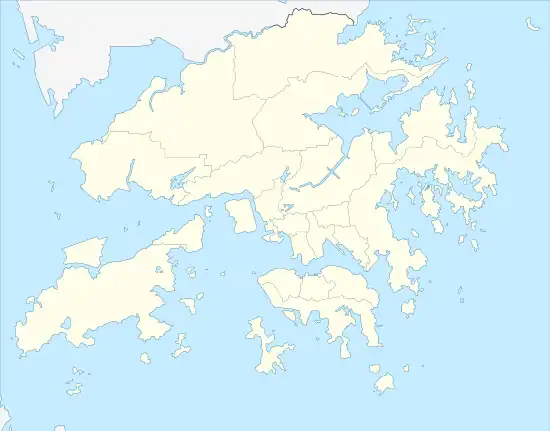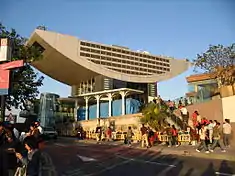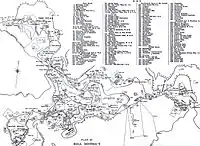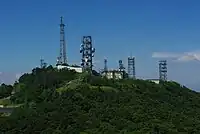Victoria Peak
Victoria Peak is a hill on the western half of Hong Kong Island. It is also known as Mount Austin, and locally as The Peak only generally. With an elevation of 552 metres (1,811 ft), it is the tallest hill on Hong Kong Island, and the 29th tallest in the territory of Hong Kong. It is a major tourist attraction offering views of Central, Victoria Harbour, Lamma Island and the surrounding islands.
| Victoria Peak | |||||||||||||
|---|---|---|---|---|---|---|---|---|---|---|---|---|---|
| Chinese name | |||||||||||||
| Chinese | 太平山 | ||||||||||||
| |||||||||||||
| Alternative Chinese name | |||||||||||||
| Chinese | 扯旗山 | ||||||||||||
| |||||||||||||
.jpg.webp) Victoria Peak from Victoria Gap | |||||||||||||
| Highest point | |||||||||||||
| Elevation | 552 m (1,811 ft) Hong Kong Principal Datum | ||||||||||||
| Prominence | 552 m (1,811 ft) | ||||||||||||
| Coordinates | 22°16′32″N 114°8′38″E | ||||||||||||
| Naming | |||||||||||||
| Native name | 太平山 (Chinese) | ||||||||||||
| Geography | |||||||||||||
 Victoria Peak Location of Victoria Peak in Hong Kong | |||||||||||||
| Location | Central and Western District, Hong Kong Island | ||||||||||||
The summit of Victoria Peak is occupied by a radio telecommunications facility and is closed to the public. The surrounding area of public parks, tourist facilities and high-value residential land is the area that is normally meant by the name The Peak. The Peak also refers to Victoria Peak itself and its nearby areas, including Victoria Gap, Mount Kellett and Mount Gough. Sometimes Bowen Hill may also be included.[1]
Victoria Peak is one of the most expensive residential areas in Hong Kong, but less so than Deep Water Bay and Jardine's Lookout.[2][3]
History
As early as the 19th century, the Peak attracted prominent European residents because of its panoramic view over the city and its temperate climate compared to the sub-tropical climate in the rest of Hong Kong. The sixth Governor of Hong Kong, Sir Richard MacDonnell had a summer residence built on the Peak circa 1868.[4] Those that built houses named them whimsically, such as The Eyrie, and the Austin Arms.
These original residents reached their homes by sedan chairs, which were carried up and down the steep slope of Victoria Peak. This limited development of the Peak until the opening of the Peak Tram funicular in 1888.[4][5]
The boost to accessibility caused by the opening of the Peak Tram created demand for residences on the Peak. Between 1904 and 1930, the Peak Reservation Ordinance designated the Peak as an exclusive residential area reserved for non-Chinese. They also reserved the Peak Tram for the use of such passengers during peak periods. The Peak remains an upmarket residential area, although residency today is based on wealth.
In 1905, construction of the Pinewood Battery was completed on the western side of the Peak. Harlech Road was constructed around the Peak as a means of resupply to this artillery and later anti-aircraft battery.
During 1904 and 1947, Chinese people were not allowed to live on the Peak according to the Peak District Reservation Ordinance when Hong Kong was a colony. In the 1920s Robert Hotung was the first Chinese person to live on the Peak because at the time he was considered mixed-race.[6] Ho Tung Gardens located at 75 Peak Road, was owned by Robert Hotung for decades, until it was sold in 2015 for HK$5.1 billion or HK$82,258 per sq.ft.
Historically, apart from houses owned by the government, banks and corporations and lived by their officials and chairmen, the Peak also had some multi-block estates, with medium-sized flats used as housing for more junior staff. These are located on less prestigious streets, such as Guildford Road and Mount Kellett Road, which face Southside instead of Victoria Harbour.[7]
In November 1996 businessman Wong Yuk Kwan paid HK$540 million for a house at 23 Severn Road called 'Genesis,' which was built in the 1980s by Heung Chi-kau. Another house Wong bought was 10-18 Pollock's Path, known as 'Skyhigh.' Owned by HSBC and lived by the bank's Chairmen, Skyhigh was sold to Kazuo Wada, the president of Yaohan, for HK$85 million in early 1990s. Because Yaohan went bankrupt, Kazuo Wada sold to businessman Wong Yuk Kwan for HK$370 million. In 2004, after SARS, actor Stephen Chow bought Skyhigh, and brought in Ryoden Development as a joint venture partner to rebuild the land into four houses.[8] Genesis was sold by creditors in 2001 for HK$240m, less than 50% of what Wong Kwan paid.[9][10]
These property transactions at the Peak were desperate sale by cash-strapped businessmen during economic crisis.[11]
Changes in neighbourhood
Some large houses on The Peak with historic values, including homes of consulates, and government buildings were demolished over the decades and redeveloped into smaller houses within managed complexes. In 2006, Sun Hung Kai Properties paid HK$1.8b, or 42,196 per sq.ft. through a government auction for a plot at 12 Mount Kellett Road, where there were blocks of flats as housing for medium-grade officials.[12] In 2022, a house at the complex 'Twelve Peaks' at 12 Mount Kellett Road was sold by the creditors of HNA Chairman Chen Feng, whose business in mainland China was bankrupt, for HK$390m, or HK$91,959 per sq. ft. Chen Feng paid HK$506m in 2016 or HK$119,323 per sq.ft.[13]
Despite record-breaking transactions reported by international news, In fact, The Peak is not the most expensive residential area in Hong Kong. Deep Water Bay and Jardine's Lookout are also one of the most expensive residential areas. A house at 75 Deep Water Bay Road, near Li Ka-shing's home, was sold by Pan Sutong for HK$3.3b, or HK$240,000 per sq.ft.,[14] Cheung Chung-kiu, Chairman of CC Land, purchased 1 Purves Road, Jardine's Lookout for about HK$760 million, or around HK$100,000 per square foot.[15] In 2018, a site on Perkins Road, Jardine's Lookout, was sold for HK$145,000 per sq.ft.[16] Transactions of these two houses that do not face harbour views indicate a few with harbour views in Jardine's Lookout are valued at around HK$200,000 per sq.ft.
Another benchmark for measuring values is the annual published figures by the government's rating and valuation department, based on estimated rental values, although such properties are not rented out to third parties. In 2019, Joseph Lau Luen-hung's residence at Goldsmith Road ranked the fifth. In 2018, this house was reportedly by Apple Daily to be worth HK$2.5 billion. Translating into HK$250,000 based on inside area of around 10,000 square feet, its value surpasses all single houses in Hong Kong. Figures published in 2021 included 35 Barker Road, owned by Lee Shau-kee and a house on Mount Nicholson among the top five most valuable houses. However, 35 Barker Road consists of three houses, and so it should not be compared to other houses.
Hong Kong's richest tycoons including Li Ka-shing, Sun Hung Kai Properties' Kwok family, Joseph Lau Luen-hung live in Deep Water Bay and Jardine's Lookout and not the Peak. There are no apartment buildings, hospitals and schools close to their houses. The Peak has a diverse mix of apartment buildings and houses, and as a tourist destination, also has hospitals, schools and malls. Many properties are also owned for rental purposes typically occupied by expatriate.[17] The Mount Austin is a complex owned by Nan Fung Group with apartments of sizes ranging from 696 sq.ft.[18]
Barker Road is one of the most desirable streets because it is located below the level where harbour views are affected during foggy seasons. In 2010, Lee Shau Kee, Chairman of Henderson Land Development, bought a site at 35 Barker Road for HK$1.82b and rebuilt into three houses as his family's dwellings after originally living in a penthouse on Mid-levels. In 2015, Alibaba's founder Jack Ma bought a house on Barker Road for HK$1.5b or HK$150,000 per sq.ft.[19]
In 2020, developer The Wharf (Holdings) bought a plot at Mansfield Road on the Peak for HK$12b or HK$46,300 per sq. ft. through government auction. This site is one of the last plots of sites owned by the Hong Kong Government used previously as accommodation for civil servants.[20]
Ecology
The Peak is home to many species of birds, most prominently the black kite, and numerous species of butterflies.[21] Wild boar and porcupines are also seen on Peak, along with a variety of snakes.[22]
Tourism


.jpg.webp)



With some seven million visitors every year, the Peak is a major tourist attraction of Hong Kong.[23] It has views of the city and its waterfront. The viewing deck also has coin-operated telescopes that the visitors can use to enjoy the cityscape. The number of visitors led to the construction of two major leisure and shopping centres, the Peak Tower and the Peak Galleria, situated adjacent to each other.
The Peak Tower incorporates the upper station of the Peak Tram, the funicular railway that brings passengers up from the St. John's Anglican Cathedral in Hong Kong's Central district, whilst the Peak Galleria incorporates the bus station used by the Hong Kong public buses and green minibuses on the Peak. The Peak is also accessible by taxi and private car via the circuitous Peak Road, or by walking up the steep Old Peak Road from near the Zoological Botanical Gardens or the Central Green Trail from Hong Kong Park. The nearest MTR station is Central.[24]
Victoria Peak Garden is located on the site of Mountain Lodge, the Governor's old summer residence, and is the closest publicly accessible point to the summit. It can be reached from Victoria Gap by walking up Mount Austin Road, a climb of about 150 metres (490 ft). Another popular walk is the level loop along Lugard and Harlech Roads, giving good views of the entire Hong Kong Harbour and Kowloon, as well as Lantau and Lamma Islands, encircling the summit at the level of the Peak Tower.[25]
There are several restaurants on Victoria Peak, most of which are located in the two shopping centres. However, the Peak Lookout Restaurant, is housed in an older and more traditional building which was originally a spacious house for engineers working on the Peak Tramway. It was rebuilt in 1901 as a stop area for sedan chairs, but was re-opened as a restaurant in 1947.
Official residences
The Peak is home to a few other key officials in Hong Kong:
- 19 Severn Road – residence of the Secretary for Justice
- Victoria House and Victoria Flats at 15 Barker Road – residence of the Chief Secretary for Administration
- Headquarters House 11 Barker Road – residence of the Commander of PLA Forces in Hong Kong and former home of the Commander-in-Chief of British Forces
- Chief Justice's House 18 Gough Hill Road – residence of the Chief Justice of the Court of Final Appeal
Education
Victoria Peak is in Primary One Admission (POA) School Net 11. Within the school net are multiple aided schools (operated independently but funded with government money) and the following government schools: Bonham Road Government Primary School and Li Sing Primary School (李陞小學).[26]
German Swiss International School maintains a campus on Victoria Peak.[27]
Alternative names
| Name | Cantonese (Jyutping) | Etymology |
|---|---|---|
| 太平山頂 | Taai3ping4saan1 Deng2 | Literally "pacific mountain peak" or "mountain peak of great peace" |
| 山頂 | Saan1 Deng2 | Literally "mountain top"; corresponds to the English name "The Peak" |
| 扯旗山 | Ce2kei4 Saan1 | Literally means "flag-raising mountain" |
| 爐峰 | Lou4 Fung1 | Literally means "furnace peak" |
| 維多利亞山 | Wai4do1lei6aa3 Saan1 | A phonetic transliteration of the English name "Victoria Peak" |
| 柯士甸山 | O1si6din1 Saan1 | A phonetic transliteration of the English name "Mount Austin" |
Cityscape
Climate
| Climate data for The Peak (2004–present) | |||||||||||||
|---|---|---|---|---|---|---|---|---|---|---|---|---|---|
| Month | Jan | Feb | Mar | Apr | May | Jun | Jul | Aug | Sep | Oct | Nov | Dec | Year |
| Record high °C (°F) | 25.0 (77.0) |
28.0 (82.4) |
26.9 (80.4) |
29.0 (84.2) |
32.6 (90.7) |
32.7 (90.9) |
32.3 (90.1) |
32.9 (91.2) |
32.1 (89.8) |
30.6 (87.1) |
28.7 (83.7) |
25.5 (77.9) |
32.9 (91.2) |
| Average high °C (°F) | 16.4 (61.5) |
17.5 (63.5) |
19.5 (67.1) |
22.7 (72.9) |
25.8 (78.4) |
27.3 (81.1) |
28.4 (83.1) |
28.5 (83.3) |
27.9 (82.2) |
25.5 (77.9) |
22.0 (71.6) |
18.0 (64.4) |
23.3 (73.9) |
| Daily mean °C (°F) | 13.3 (55.9) |
14.5 (58.1) |
16.6 (61.9) |
20.1 (68.2) |
23.3 (73.9) |
25.1 (77.2) |
25.8 (78.4) |
25.7 (78.3) |
25.0 (77.0) |
22.5 (72.5) |
19.2 (66.6) |
15.0 (59.0) |
20.5 (68.9) |
| Average low °C (°F) | 11.1 (52.0) |
12.3 (54.1) |
14.5 (58.1) |
18.2 (64.8) |
21.5 (70.7) |
23.4 (74.1) |
24.0 (75.2) |
23.8 (74.8) |
23.2 (73.8) |
20.7 (69.3) |
17.3 (63.1) |
12.8 (55.0) |
18.6 (65.5) |
| Record low °C (°F) | −1.0 (30.2) |
4.1 (39.4) |
4.9 (40.8) |
9.4 (48.9) |
13.4 (56.1) |
17.9 (64.2) |
19.8 (67.6) |
20.8 (69.4) |
18.1 (64.6) |
12.4 (54.3) |
6.3 (43.3) |
3.5 (38.3) |
−1.0 (30.2) |
| Average precipitation mm (inches) | 34.7 (1.37) |
30.4 (1.20) |
71.5 (2.81) |
138.6 (5.46) |
310.8 (12.24) |
496.4 (19.54) |
392.4 (15.45) |
384.8 (15.15) |
245.8 (9.68) |
92.4 (3.64) |
44.7 (1.76) |
30.5 (1.20) |
2,273 (89.49) |
| Average rainy days (≥ 0.5 mm) | 6.1 | 9.0 | 9.8 | 11.0 | 14.0 | 18.4 | 17.3 | 15.7 | 13.6 | 7.1 | 6.0 | 5.1 | 133.1 |
| Source: Hong Kong Observatory[28][29][30] | |||||||||||||
See also
- List of places in Hong Kong
- List of mountains, peaks and hills in Hong Kong
- List of places named after Queen Victoria
- The Peak Hotel, a hotel located on Victoria Peak from 1888 to 1936
- Peak District Reservation Ordinance 1904
- Tourism in Hong Kong
References
- Hong Kong Police Museum in the Wan Chai Gap, Bowen Hill. It is an example of being included of the Peak District.
- am730 (4 February 2016). "香港哪一區最豪?". am730 (in Chinese). Retrieved 16 January 2023.
- 蔡偉南 (12 May 2021). "潘蘇通深水灣道75號大宅傳36億獲洽 高銀金融:不作評論". 香港01 (in Chinese (Hong Kong)). Retrieved 16 January 2023.
- "The Peak History". The Peak. Archived from the original on 7 March 2007. Retrieved 14 March 2007.
- "Peak Tram History". The Peak Hong Kong. Archived from the original on 20 February 2007. Retrieved 13 March 2007.
- "Why Were Chinese People Banned from The Peak?". The Loop HK. 14 March 2016. Retrieved 18 March 2022.
- "HSBC's Peak asset for sale". South China Morning Post. 5 July 2006. Retrieved 18 March 2022.
- "blown it all skyhigh". South China Morning Post. 18 May 1997. Retrieved 18 March 2022.
- Booth, Jason (6 December 2001). "Hong Kong's Genesis Mansion Is Bought for $29.5 Million". The Wall Street Journal. ISSN 0099-9660. Retrieved 18 March 2022.
- "CNN.com – Bank seizes 'world's most expensive' house – July 25, 2001". CNN. Retrieved 18 March 2022.
- Booth, Jason (6 December 2001). "Hong Kong's Genesis Mansion Is Bought for $29.5 Million". The Wall Street Journal. ISSN 0099-9660. Retrieved 6 May 2022.
- "HK$1.8b Peak site world's most expensive". South China Morning Post. 20 December 2005. Retrieved 18 March 2022.
- "HNA Creditors Sell Seized Luxury Home on Hong Kong's Peak". Mingtiandi. 13 January 2022. Retrieved 18 March 2022.
- 蔡偉南 (12 May 2021). "潘蘇通深水灣道75號大宅傳36億獲洽 高銀金融:不作評論". 香港01 (in Chinese (Hong Kong)). Retrieved 18 March 2022.
- "Jardine's Lookout remains magnet for wealthy mainlanders". South China Morning Post. 8 September 2017. Retrieved 18 March 2022.
- Standard, The. "Luxury site sees huge price drop". The Standard. Retrieved 18 March 2022.
- am730 (4 February 2016). "香港哪一區最豪?". am730 (in Chinese). Retrieved 10 July 2022.
- "The Mount Austin|Peak|Estate Info|Centaline Property". hk.centanet.com. Retrieved 4 September 2022.
- "Has Alibaba's Jack Ma bought HK$1.5 billion home on Hong Kong's Peak?". South China Morning Post. 13 August 2015. Retrieved 18 March 2022.
- "Wharf Wins Mansfield Road Site on Hong Kong's Peak". Mingtiandi. 24 December 2020. Retrieved 18 March 2022.
- "We love Butterflies". greenpower.org.hk. Retrieved 12 December 2021.
- "Photo of the Week #8: Porcupine on The Peak". StripedPixel.com. 1 December 2013.
- DeWolf, Christopher "9 Hong Kong tourist traps – for better or worse" Archived 1 November 2012 at the Wayback Machine CNN Go. 27 October 2010. Retrieved 3 March 2012.
- "Hong Kong: 10 Things to Do – 1. Victoria Peak – TIME". Time. content.time.com. Retrieved 4 November 2016.
- "Nature Walks". The Peak | I ♥ you. Retrieved 19 January 2018.
- "POA School Net 11" (PDF). Education Bureau. Retrieved 12 September 2022.
- "Contact Us". German Swiss International School. Retrieved 12 September 2022.
Peak Campus [...] 11 Guildford Road The Peak, Hong Kong 香港山頂僑福道11號
- "Monthly Means of Meteorological Elements for The Peak, 2004-2017". Hong Kong Observatory. Retrieved 29 May 2018. 山頂氣象要素月平均值 (2004-2017)
- "Monthly Means of Meteorological Statistics for The Peak, 2004-2017". Hong Kong Observatory. Retrieved 29 May 2018. 山顶气象统计月平均值 (2004-2017)
- "Extreme Values and Dates of Occurrence of Extremes of Meteorological Elements between 1884-1939 and 1947-2017 for Hong Kong". Hong Kong Observatory. Retrieved 29 May 2018.

